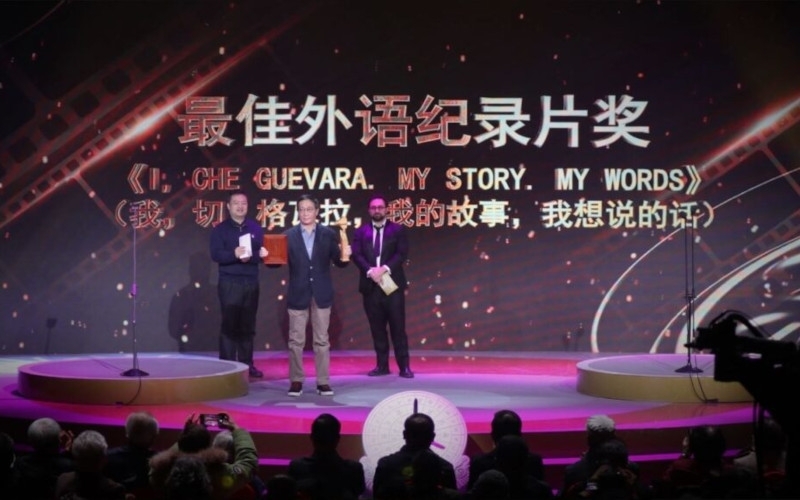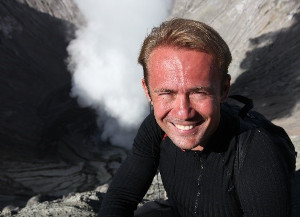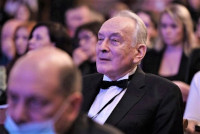
April 21, at 19:00 (Moscow time) in Moscow (Russia), on the stage of the Great Hall of the House of Cinema, the Chinese Academy Awards in the Documentary Cinema (China Documentary Film Award) will be presented. For the first time in 11 years this prestigious award in China was awarded to Russian cinematographers.
The event is supported by the Presidential Foundation for Cultural Initiatives.
The Eurasian Peoples’ Assembly and the Eurasian Academy of Television and Radio present films of Russia’s participants for the award. Six Russian films of these that have received Academy diplomas (CAADF) have been nominated.

For the first time, the Academy Award for "Best Documentary in a Foreign Language" was awarded to the Russian documentary filmmaker Vyacheslav Krasko for the film "I am Che Guevara. A story in the first-person narrative" (film company "The Year of Spring").
“Che Guevara’s” competitors were nominees from the USA, South Korea and Belarus. In total, 1,212 applications from 600 film companies were submitted for consideration in 2021.

The Chinese Academy Award of Documentary Film is a very significant award for China; it is awarded at the state level. The award was established in 2011 to mark the 100th anniversary of Chinese documentary cinema. Its laureates have received international recognition and a high IMDb rating.
Russian nominees
- "I am Che Guevara. A story in the first-person narrative" (film company "The Year of Spring"), directed by Vyacheslav Krasko
- "DUM VIVIMUS VIVAMUS. While we are alive, we will live" (film company "Miriam–Media"), directed by Grigory Ilugdin
- "Ice Clouds" (studio "Positive-film"), directed by Boris Dvorkin
- "There in the distance" (studio "Another Sky"), directed by Victoria Fomina
- "Russian Gardariki" (TV company "Format TV"), directed by Anna Kolodezneva
- "Celestial Crimea" (film company "Two Captains"), directed by Sergey Debizhev (was also nominated "For best editing" and was awarded two diplomas of the Academy)
At a solemn ceremony in Beijing on December 29, 2021, the awards of Russian cinematographers were received by the vice-president of the EATR, producer, president of the Beijing Chuanshiji Company Wu Jiang and the press attaché of the Russian Embassy in China Georgy Egorov.

In 2021, three film figures were awarded honorary awards of the Chinese Academy with the wording "For outstanding Contribution to the development of international communications": British documentary filmmaker Malcolm Clark (four times nominated for an Academy Award and twice won it), producer Vikram Channa from India (known in Russia for speaking at TEDx in Japan) and producer from Russia Valery Ruzin.
Valery Ruzin, Deputy Secretary General of the Eurasian Peoples’ Assembly, President of the Eurasian Academy of Television and Radio, member of the Union of Cinematographers of the Russian Federation, made a significant contribution to the promotion of Russian and Chinese documentary films in the international arena.
The cultural resources of our countries are inexhaustible. And the more we share them, the richer we become.
Through joint efforts, we form a common cultural and information space of our countries, affirm a common view of the past, reflect the present and model the future.
The Chinese Academy for Documentary Film, the structure of the Documentary Film Research Center, unites leading Chinese figures of non–fiction films: directors, producers, film market experts, etc. Among the Academy members are famous cinematographers Wang Zhanghai, Yu Xiaogang, Wu Jiang, He Sulyu.
Professor He Sulyu is the Director of the Documentary Film Research Center at Beijing University of Communications. He is the creator of a comprehensive documentary film evaluation system, a member of the National Committee of Experts under the Ministry of Culture of China, an academician of the Eurasian Academy of Television and Radio, a member of the Eurasian Peoples’ Assembly.
The Documentary Film Research Center works with the BRICS countries to create joint documentaries within the BriDoc program.

About the film "I am Che Guevara. A story told in the first-person narrative"
What should happen for an ordinary student to take up arms and become a revolutionary?

What should happen for an intelligent guy from Buenos Aires to first become a vagrant traveler, and then take power in Cuba?
This is the DEBUT "I am Che Guevara" of Slava Krasko is about. It tells about the youth of the famous comandante.
The author goes to Latin America and on a motorcycle exactly repeats the travel route of a student from Buenos Aires, Ernesto Guevara de la Serna, in order to create a realistic image of a man who has already become a myth. He studies Guevara’s diaries and letters, tries to feel the motives of his actions and the logic of the events that happened to him, events that shaped the character of the hero and changed his life path. In fact, this is a documentary version of the famous movie "The Diaries of a motorcyclist".
"I tell about what I saw with my own eyes. However, these fleeting impulses are dead. There is no defendant whom a heavy burden of responsibility could be imposed on. The character who wrote these notes has died <...> and now I leave you alone with yourself — the past."
The narrative is built on behalf of Ernesto, exclusively on his personal diaries and poems, as well as on the testimonies of people close to him. The film stars Comandante's brother Juan Martin Guevara, his childhood friends Alberto Granado, Calica Ferrer and others. (с)iИМЕННО
Vyacheslav Krasko is a traveler, a member of the Union of Circumnavigators of Russia. He graduated from St. Petersburg State University of Economics and Finance, at the same time studied in France at the Paris-Dauphin IX University of Economics, held senior positions in major holdings and companies. In 2010-2011, he left his career and made a trip around the world, which lasted 14 months. He wrote a book about it and later made a film. Graduate of the Higher Courses of Screenwriters and Directors named after G. Danelia (workshop of V.I. Khotinenko - P.K. Finn - V.A. Fenchenko, class of 2018).
The film "I am Che Guevara" is the winner of the Contest of film schools of the 16th International Film Festival "WON TOGETHER" named after Vladimir Menshov in 2020.
About the film "Celestial Crimea"
Crimea is presented in the film as a smaller copy of the planet, as the "living heart" of the Earth. In this place lies the powerful energy of the four elements, there is everything here: mountains, sea, forests, tropics, savannah, sandy deserts, swamps, extinct volcanoes, salt lakes – such cosmic landscapes that are not at all like our planet. Shooting from space allows you to emphasize the planetary scale of the narrative. New technologies demonstrate unique natural objects and phenomena inaccessible to the human eye.

Sergey Debizhev's work is a new word in documentary. Given the current situation, it is primarily an art event.
Sergey Debizhev is a famous Soviet and Russian film director, music video maker, screenwriter. For Debizhev, Crimea, which returned to its native home as a result of not just special historical circumstances, but divine providence, is a sacred land with a unique nature, a unique cultural heritage, a unique focus of energy flows.
He graduated from the V.A. Serov Leningrad Art School – specialty "Design Graphics", V.I. Mukhina Leningrad Higher Art and Industrial School - Faculty of System Design. Debizhev taught composition at the college named after V.A. Serov. In the mid-1980s, he worked as an artist on Alexander Sokurov's documentaries.
He was awarded the prize "For Contribution to Documentary Cinema" at the 16th International Film Festival "WON TOGETHER" named after Vladimir Menshov in 2020.
About the Documentary series "Russian Gardariki"
Few people know that people similar to modern ones appeared on the territory of the Voronezh Region (Russia) several millennia ago.

According to scientists, this happened earlier than anywhere else in Europe. Moreover, these people already had a society and a culture of everyday life. The film briefly touches on other amazing finds in the sites of ancient people.
Anna Kolodezneva is the author, screenwriter, chief editor of the program "The most shocking Hypotheses" and other documentary programs of REN TV.
She graduated from the journalism faculty of Moscow State University, worked for a long time as a reporter of the criminal chronicle, an international editor in the federal news programs of Channel One and Rossiya-24.
About the film "While we are alive, we will live"

One of the first chronicle films from the front of the COVID-19 pandemic, which became a shock to humanity. The authors reflect that the pandemic has not only physically changed us, but also raised many previously unknown questions to society. The heroes of the picture were more than forty people who came into direct contact with the virus.
Grigory Ilugdin is a documentary filmmaker, academician of the Eurasian Academy of Television and Radio (EATR), member of the Union of Cinematographers of Russia and the Guild of Film Directors of Russia.
He graduated from the Latvian State University and the All-Union State Institute of Cinematography.
Winner of the International Film Festival "WON TOGETHER" named after Vladimir Menshov.
About the film "Ice Clouds"
The film tells about the polar pilot, Hero of the Soviet Union Anatoly Alekseev. He participated in the rescue of Umberto Nobile's Arctic expedition in 1928, landed the first scientific research expedition led by Ivan Papanin at the North Pole in 1937, and was one of those Soviet pilots who carried out the bombing of Berlin in the summer of 1941.

The film is part of the multimedia project "Unknown Heroes of the North", which is based on rare archival materials. The project is aimed at restoring the historical memory of people whose names were undeservedly forgotten.
"It happened so that our characters found themselves in the shadow of their comrades, whose names are well known: Vilkitsky, Sedov, Schmidt, Papanin, Voronin, Chukhnovsky... – clarifies the director and author of the project Boris Dvorkin."But the contribution of these polar explorers to the history of the development of the North of Russia was no less significant."
Boris Dvorkin is a non–fiction film director, graduated from the Leningrad Maritime School of the MMF, but devoted almost his whole life to directing, a member of the Union of Cinematographers of Russia, a member of the Guild of Non-fiction Films, an academician of the Eurasian Academy of Television and Radio (EATR).
Winner of the International Film Festival "WON TOGETHER" named after Vladimir Menshov.
About the film "There, in the distance"
The film is dedicated to the Holy Martyr Mikhail Belorossov (1869-1920). The film starred parishioners of the Trinity Church of Romanov-Borisoglebsk (now Tutaev). They weren't playing anything, just trying to imagine his last day. The action of the film begins a hundred years ago with the destruction of the temple and the murder of its abbot, and ends in the XXI century…

The film is one of the components of the interactive media package "Romanov-Borisoglebsk. Spiritual History", created by the studio "Other Sky", which aims to explore the four-dimensional space of life in the language of cinema. The film became a prize-winner of many international film festivals.
Victoria Fomina is a documentary filmmaker, PhD in art history, associate professor of MGPPU, academician of the EATR, member of the Union of Journalists of Russia, Head of the studio "Other Sky".
Only documentary films will make Greater Eurasia a continental union of like-minded people!


